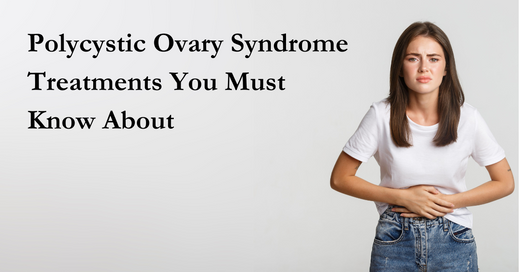
Polycystic Ovary Syndrome Treatments You Must Know About
Share
Managing Polycystic Ovarian Syndrome (PCOS) can feel overwhelming, but it's important to know there are a range of treatment options available to address different aspects of the condition. It’s completely understandable to feel uncertain about which path to take, but knowing your options can empower you to make informed decisions. Let us look at the various polycystic ovary syndrome treatment options available.
Table of Contents
- Polycystic Ovary Syndrome: Natural Treatment
- Dietary Modifications:
- Physical Activity
- Weight Management
- Supplements
- Herbal Remedies
- Stress Management
- Bilateral Polycystic Ovary Syndrome Treatment
- Polycystic Ovary Syndrome Acne Treatment
- Polycystic Ovary Syndrome Ayurvedic Treatment
- Polycystic Ovary Syndrome Surgical Treatment
- Frequently Asked Questions:
Polycystic Ovary Syndrome: Natural Treatment

Polycystic Ovary Syndrome (PCOS) can be effectively managed through a combination of lifestyle modifications, dietary adjustments, and natural remedies. The natural approaches listed below can be beneficial in alleviating symptoms.
Dietary Modifications:
- Low Glycaemic Index (GI) Diet encourages the consumption of foods with a low glycaemic index to aid in blood sugar control. This includes whole grains, legumes, vegetables, and fruits.
- Include foods with anti-inflammatory properties, such as leafy greens, berries, nuts, seeds, and fatty fish, including salmon.
- A well-balanced, nutritious diet high in lean proteins, healthy fats, and complex carbohydrates benefits overall health and hormonal balance.
Physical Activity
Regular physical activity, such as walking, cycling, and strength training, can help with weight management and insulin sensitivity.
Weight Management
Losing even a small amount of weight can significantly improve your symptoms and hormonal balance.
Supplements
- Inositol is effective at increasing insulin sensitivity and improving ovarian function.
- Omega-3 fatty acids, found in fish oil or flaxseed oil, are excellent for reducing inflammation and maintaining overall health.
- Many women with PCOS have low vitamin D levels, and taking a supplement can help with symptoms and hormonal balance.
- Magnesium can improve insulin sensitivity while also reducing inflammation.
Herbal Remedies
- Some research shows that spearmint tea might help lower those pesky androgen levels and improve issues like excess hair growth.
- Cinnamon is a spice that can improve insulin sensitivity and reduce blood sugar levels.
Stress Management
Relaxation Techniques like yoga, meditation, and deep breathing can really help you relax, which is great for keeping your hormones in check.
Bilateral Polycystic Ovary Syndrome Treatment
Bilateral Polycystic Ovarian Syndrome is a hormonal disorder characterised by enlarged ovaries containing multiple small cysts that disrupt normal egg release, causing irregular menstrual cycles and fertility issues. PCOS is classified into four types based on its primary symptoms: insulin-resistant PCOS, post-pill PCOS, inflammatory PCOS, and hidden-cause PCOS. You can take a few steps to manage your symptoms and restore hormonal balance.
- Lifestyle changes, such as eating well, staying active, and maintaining a healthy weight, can all help with PCOS.
- Depending on what you’re experiencing, your doctor might suggest some medication. This could include birth control pills to help regulate your periods, anti-androgens to combat unwanted hair and acne, or insulin-sensitising drugs if you are dealing with insulin resistance.
Polycystic Ovary Syndrome Acne Treatment

Managing acne associated with Polycystic Ovary Syndrome (PCOS) can be quite challenging; however, there are numerous strategies available to address this issue. Below are several recommendations:
Lifestyle and Dietary Modifications:
To manage acne, it is recommended to adopt a balanced diet rich in low-glycaemic foods, including whole grains, lean proteins, fruits, and vegetables, while reducing sugars and processed carbs. Regular physical activity can help regulate insulin levels and hormones, potentially alleviating acne. Additionally, managing stress through relaxation techniques like yoga, meditation, or deep breathing can be beneficial, as stress may worsen acne.
Over-the-Counter Treatments:
- Consider using retinoid-containing products (such as adapalene) to help unclog pores and reduce inflammation.
- Benzoyl peroxide is an ingredient that effectively kills acne-causing bacteria and can help with breakouts.
- Salicylic acid is another effective option for keeping skin clear.
Polycystic Ovary Syndrome Ayurvedic Treatment
Ayurveda is a holistic way of treatment. Ayurvedic treatment for PCOS typically combines herbs, treatments, and lifestyle adjustments, such as food.
Ayurvedic herbal treatment for PCOS
Although Ayurvedic therapy for PCOS includes the use of certain medications, mostly to maintain hormonal balance, this includes:
- Ashwagandha, also known as Indian ginseng or winter cherry, can help regulate cortisol levels, reducing stress and PCOS symptoms.
- Cinnamon, derived from the cinnamon tree's bark, helps improve insulin resistance characteristics in PCOS. According to studies, cinnamon may help people with PCOS regulate their menstrual cycles.
- Turmeric's yellow colour comes from its active component, curcumin. Curcumin has shown potential as an anti-inflammatory agent and a strategy to reduce insulin resistance.
Ayurvedic Treatments for PCOS
Your practitioner may offer meditation and breathing techniques called pranayamas to help relieve stress. They may suggest yoga poses commonly known as asanas, such as:
- Reclining Butterfly Pose (Supta Baddha Konasana).
- Bharadvaja’s Twist (Bharadvajasana)
- Mill Churning Pose (Chakki Chalanasana).
- Corpse Pose (Shavasana).
Dietary habits prescribed by an Ayurvedic practitioner for PCOS include:
- Eating less saturated fats (such as red meat and deep-fried dishes)
- Reduce your salt intake.
- Eat more fruits, veggies, and healthy grains.
- Avoid refined sugar, sugary meals, and artificial sweeteners.
If you have PCOS-related infertility, you can try a six-month treatment plan that includes:
- Shodhana (a detox to help cleanse your body)
- Shamana (therapy to alleviate discomfort and symptoms).
- Tarpana (a way to connect with the divine)
Polycystic Ovary Syndrome Surgical Treatment
Laparoscopic ovarian drilling (LOD) is a small surgical technique that may be used to treat PCOS-related reproductive difficulties that do not respond to medication. Under general anaesthesia, your doctor will create a small cut in your lower belly and insert a long, thin microscope known as a laparoscope. The ovaries will subsequently be surgically treated with heat or a laser to eliminate the tissue that produces androgens (male hormones). LOD has been shown to reduce levels of testosterone and luteinizing hormone (LH) while increasing levels of follicle-stimulating hormone. This corrects your hormonal imbalance and allows your ovaries to operate normally again.
Conclusion
With various effective treatment options available, PCOS symptoms are manageable. Implementing lifestyle adjustments, such as eating a well-balanced diet and exercising consistently, can significantly improve your health. Furthermore, working with a healthcare professional to develop a tailored treatment plan could significantly improve your overall health and comfort. It is also important to prioritise self-care and seek assistance from those who understand your situation, as this can be beneficial.
Frequently Asked Questions:
What is polycystic ovary syndrome treatment?
Polycystic Ovary Syndrome (PCOS) treatment aims to manage symptoms primarily through lifestyle changes like weight loss and exercise to combat insulin resistance. Medications may include hormonal contraceptives for menstrual regulation and acne, insulin-sensitisers like metformin for blood sugar control, and anti-androgens for excessive hair growth.
What is the best treatment for polycystic ovary syndrome?
The best Polycystic Ovary Syndrome treatment really depends on what symptoms you're dealing with and what your health goals are. Usually, a mix of lifestyle changes like managing your weight and getting some exercise, along with specific medications, does the job.
